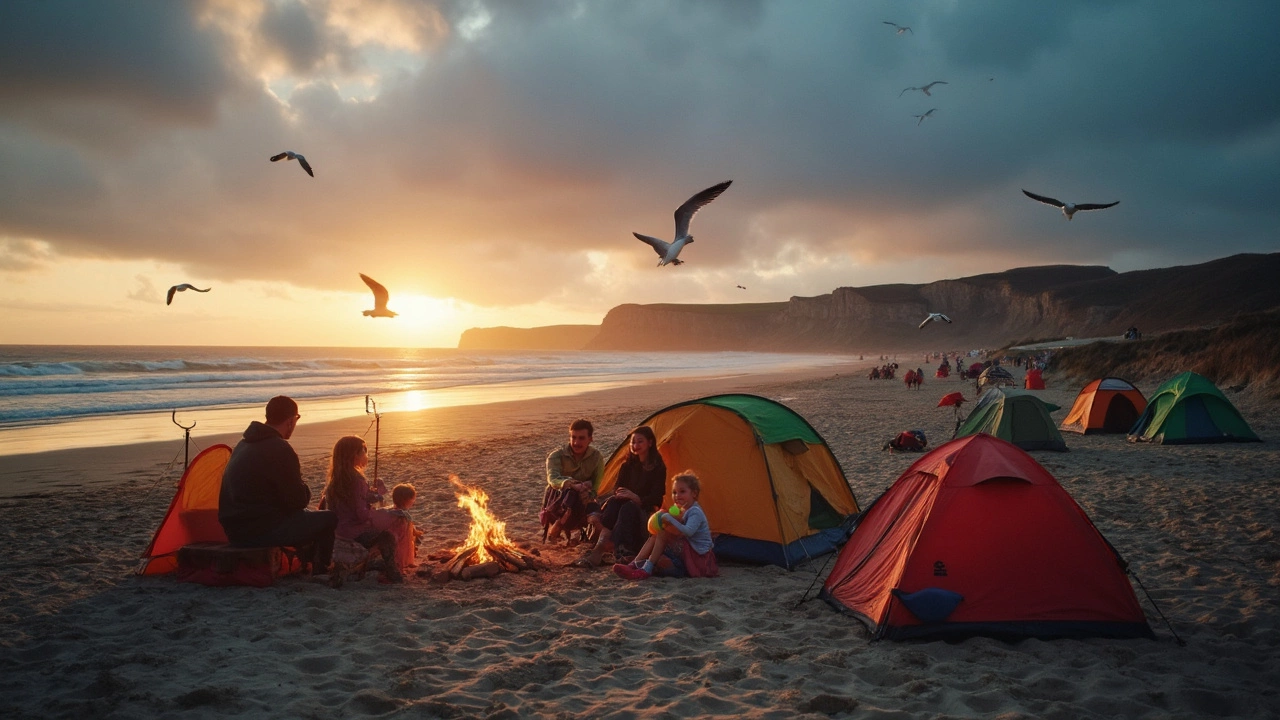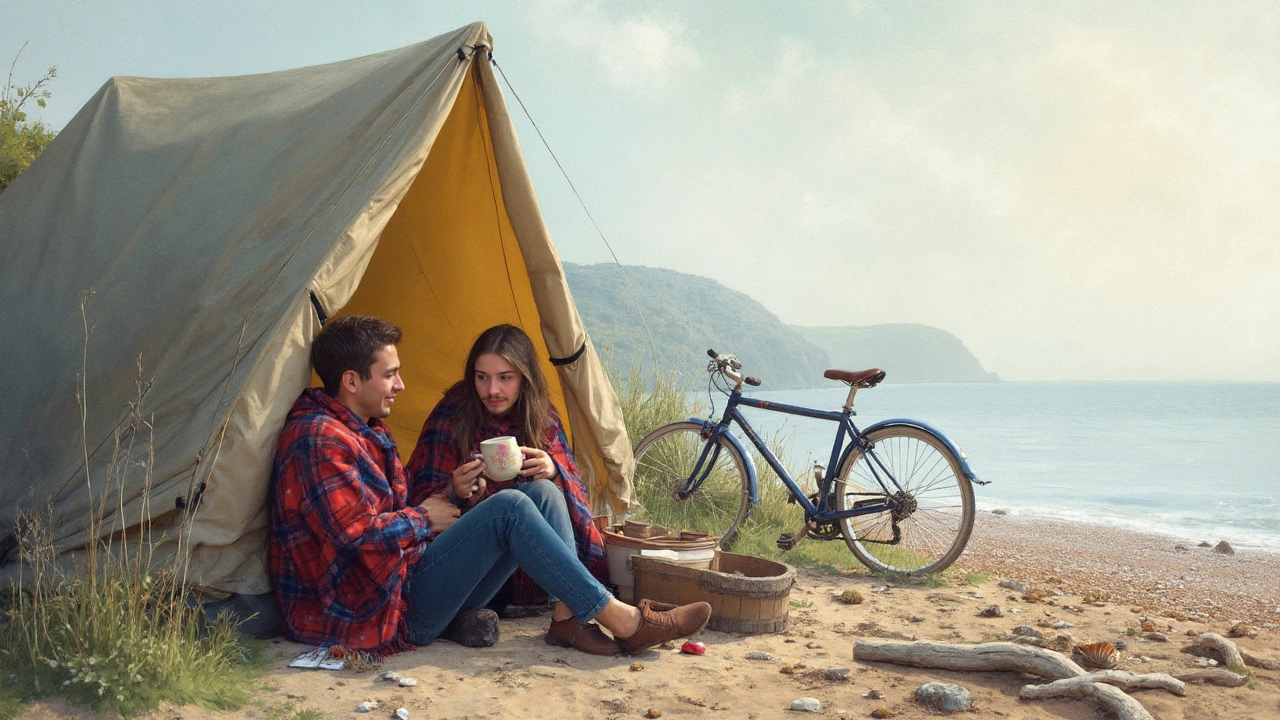Beach Camping: Why People Love Sleeping Beside the Waves
 Jun, 26 2025
Jun, 26 2025
It’s 2 a.m. The waves are rumbling, a salty breeze sneaks past your tent flaps, and somewhere, distant laughter dances with the wind. Most folks are at home staring at a screen right now, but you’re wrapped in a sleeping bag with sand on your toes. Why would anyone swap a comfy bed for sand, salty air, and the unpredictable crash of the ocean? Turns out, the answer is a lot more compelling—and practical—than just loving a tan or collecting seashells.
The Allure of Beach Camping: Why Trade Four Walls for Sand and Sky?
First, there’s the obvious: the view. Sunrises that look photoshopped, sunsets that set the sky on fire, and a nighttime ceiling dripping with stars. But there’s more going on. Studies from the University of Exeter found that people living by the sea report higher levels of happiness and less stress, and that effect ramps up when you immerse yourself right in the environment, unplugged from daily distractions. Beach camping strips life down to moments—no buzzing notifications, no endless emails, just the raw sound of tides, the scent of salt, and the crunch of sand underfoot.
If you think people do it for the Instagram clout, sure, that’s a perk, but it’s not the heartbeat of the experience. You quickly learn that on the shore, everything slows down. There’s a rhythm—setting up a tent, lighting a campfire, counting shooting stars, checking the tide. These simple rituals give your mind a break. Research by Dr. Wallace J. Nichols, author of "Blue Mind," even says our brains slip into a calmer, more meditative state when we’re near water. No surprise beach camping feels so good.
And then, there’s connection—with people and with nature. There’s a reason so many families return year after year to the same windswept beaches. Here, grilling dinner over driftwood, trading ghost stories by lantern light, or simply chasing crabs under a full moon, it’s impossible not to feel close. It’s one of the universal equalizers: nature doesn’t care about your day job, your WiFi password, or what kind of car you drive. It only cares that you showed up and stopped to listen.
It also doesn’t hurt that the beach is an ever-changing playground. One minute you’re stargazing, then surfing, then snoozing to the lullaby of waves. You get a little adventure, and a lot of freedom, from pitching your tent on a shore that’s never the same two nights in a row.
"I go to nature to be soothed and healed, and to have my senses put in order." —John Burroughs
Planning and Packing: Making the Most of a Seaside Campout
Packing for the beach feels simple at first—just a tent, right? But after your first experience waking up with a tent full of sand or your dinner washed away by a rogue tide, you’ll wish you had a better checklist. Here’s the deal: beach camping means prepping for wind, sun, salt, and unpredictability.
Let’s start with tents. You’ll want one that zips up tight and stakes deeply—light coastal winds can turn a tent into a flying object (or sand sculpture) in no time. Use sand stakes or weight down traditional stakes with bags of sand or driftwood. Elevate your sleeping gear if you can, since the beach can cool down more than you’d expect after dark and morning dew will soak you if you’re not prepped.
Sand gets everywhere. You can’t fight it, but you can manage it—bring old sheets or mats to create a clean zone outside your tent and always brush your feet off before climbing in. A small broom goes a long way in the battle against sand-covered sleeping bags.
Another big one: food and water. Some beaches might have freshwater taps, but lots don’t. Pack at least a gallon of water per person, per day. When it comes to food, prep meals that don’t spoil easily, since even the best coolers can struggle in hot sun and salt air. For cooking, opt for a portable stove if open fires are banned. If fires are allowed, stick to small, controlled campfires below the high tide line, using only deadwood or firewood you bring from home (local rules often ban the collecting of driftwood for burning).
- Beach camping checklist:
- Waterproof tent and extra stakes
- Sand mats or sheets
- Portable shade (tarps, canopies)
- Reusable water jugs
- Food in sealed containers
- Small broom/dustpan
- Headlamp or lantern (plus extra batteries)
- Sunscreen, bug repellent, first aid kit
Weather apps won’t tell you everything. Tides can sneak up, so keep your tent above the latest high tide mark—look for a line of seaweed, shells, or debris. As for sun protection, the glare off wet sand is brutal. Cover up, wear a hat, and use sunscreen that doesn’t harm marine life—check for reef-safe options.
One more pro tip: if you’re camping with kids, bring a bucket and shovel—it’s a lifesaver. If you’re camping with pets, double-check beach rules and always clean up after them.

The Magic of the Shore: What Happens When We Camp by the Sea
Ever notice how conversations around a beach campfire are somehow more honest? Something about the rolling surf, the endless horizon, and the sharp, salty air makes people drop their guard. Psychology professor Dr. Alison Gopnik says being in wild places rewires how we see our lives and connect with others. It’s part nostalgia, part chemistry—negative ions in ocean air have even been linked to mood boosts, according to a 2013 study in the journal "Psychology Today." Scientists call it the "blue effect," and honestly, you don’t need a journal article to feel it work after a day on the sand.
For kids, beach camping is pure magic—exploring tide pools after breakfast, learning to identify sand crabs, roasting sticky marshmallows while watching satellites blink overhead. These moments become core memories. For adults, it’s a reset button. Deadlines, worries, and stress literally fall away—waves drown out anxious thoughts better than any podcast. Couples rediscover old sparks, and friendships tighten over shared hardship (like chasing down an escaped tent in a sudden squall).
The wildlife show doesn’t hurt, either. Fall asleep to the chirp of sandpipers, wake up to pelicans dive-bombing for breakfast, and if you’re lucky, catch a pod of dolphins surfing the breakers at sunrise. There’s science to it, too: being outdoors strengthens immunity and lowers blood pressure. The National Park Service published a study showing outdoor overnight trips cut stress hormones by up to 28%. That’s a better argument for camping than any travel ad.
But it’s not just about wild beauty. Everyday life feels lighter at the beach. Losing your phone charger here isn’t a disaster— it’s a chance to build a driftwood sculpture. Forgot your camp chairs? Just dig out a seat in the sand. And nothing tastes better than a fresh-off-the-grill fish taco eaten cross-legged, watching the sky turn purple.
| Reason | Benefit | Real-Life Impact |
|---|---|---|
| Sleeping near ocean sounds | Improved sleep quality | 73% report deeper sleep (2019 Sleep Foundation survey) |
| Blue space exposure | Stress reduction, happiness | 48% happier than inland campers |
| Outdoor cooking/eating | Better mood, increased appetite | Kids eat 30% more fruit/veggies |
| Wildlife encounters | Education, excitement | 82% of campers spot wild seabirds |
Challenges, Surprises, and Tips from Seasoned Beach Campers
Okay, not everything is glossy and magical. Gritty sand is going to find its way into your sleeping bag, and sudden summer storms can make you pack up fast. Permits can be tricky—some public beaches ban overnight camping or limit campfire use to specific areas. Always double-check rules with local websites before you roll in with your cooler and glow sticks. And if you show up without prepping for biting flies or cackling gulls at sunrise, you might regret it.
But here’s where seasoned campers shine. First, always check the tide charts. It’s the number one rookie mistake to wake up soggy or worse, discover your tent’s halfway floating. Next, layer up. The day might be sweltering, but ocean breezes get downright chilly after dark and before dawn. If you’re worried about valuables, leave them locked in your car or at home—beach campsites are generally safe, but you can’t be too careful.
Campfires need respect. Never, ever leave one unattended, and always douse it fully before bed. A bucket of water can double as fire safety and sand rinse. For cooking, keep it simple—no one wants to chase a casserole dish through dune grass. Classic fire-cooked meals (burgers, foil-packet veggies, hot dogs) work best. Strap down your garbage and double-bag food to keep curious critters at bay. If you fish, know the local regulations and only keep what you’ll eat. If you’re lucky enough to watch a sea turtle crawl ashore to nest, give it space. Keep lights dim, stay quiet, and soak up that once-in-a-lifetime sight.
Your reward? You’ll head home sandy and sunburnt but feeling like you hit life’s reset button. The beach, after all, doesn’t just invite you to camp—it dares you to find wonder in the basics. Every grain of sand, every stolen wave, reminds you that living a little wild might just be good for the soul.